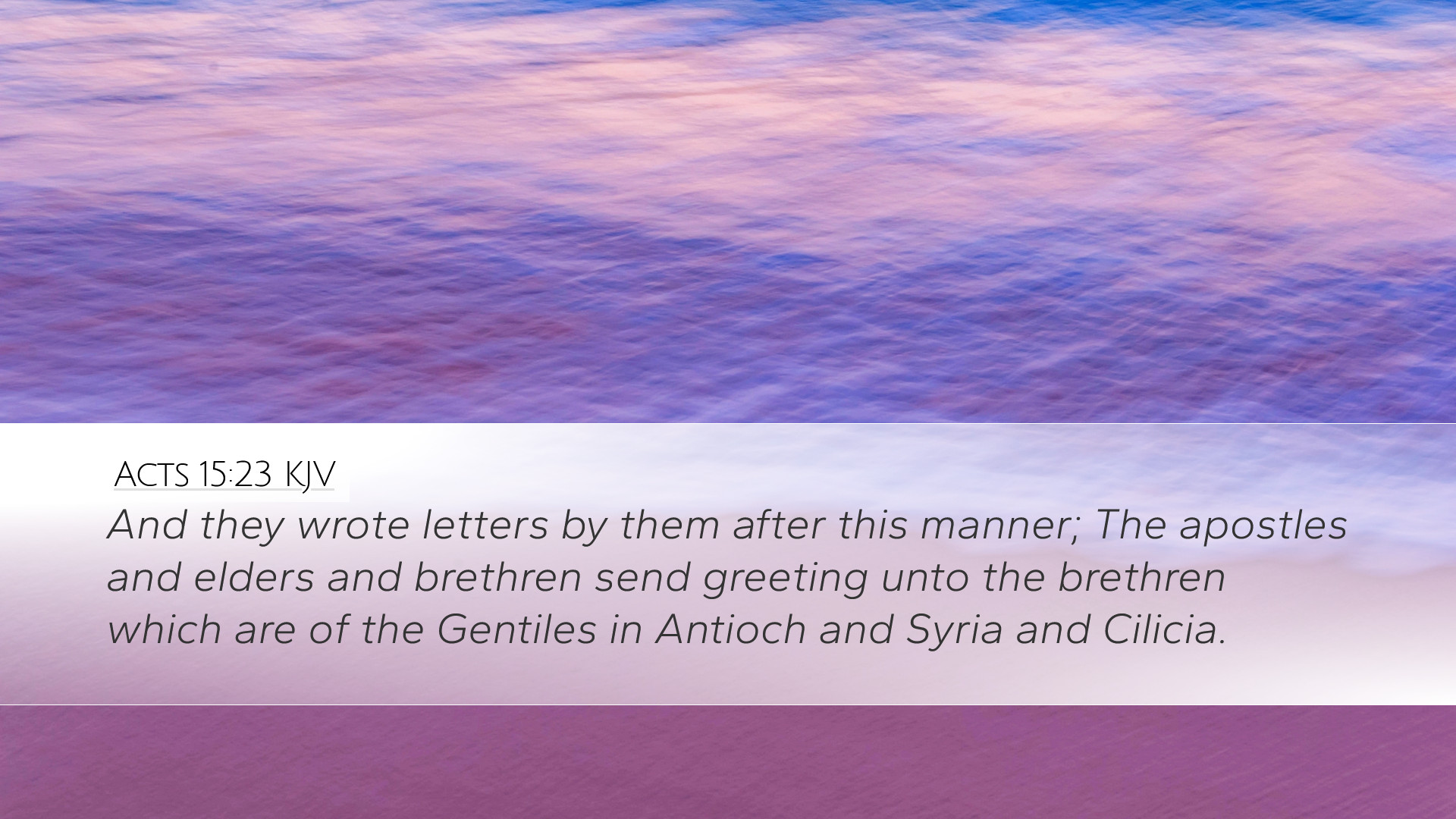Acts 15:23 - Commentary Overview
Acts 15:23 is a pivotal verse in the context of the early church's struggle with the inclusion of Gentiles and the necessity of adhering to Jewish law. The Apostle Paul and Barnabas had just returned from their mission, and a decision was made to send a letter to the Gentile believers concerning the requirements of faith.
Text of the Verse
Acts 15:23 (KJV): "And they wrote letters by them after this manner; The apostles and elders and brethren send greeting unto the brethren which are of the Gentiles in Antioch and Syria and Cilicia:"
Contextual Background
The Council of Jerusalem, as chronicled in Acts 15, addressed whether Gentile converts to Christianity needed to adhere to Jewish ceremonial laws. This incident occurred against the backdrop of a growing church that was becoming increasingly diverse. Jewish Christians were grappling with how the new faith aligned with their traditions, the Law of Moses, and the inclusion of Gentiles.
Commentary Insights
Matthew Henry: Henry emphasizes the unity of the early church and the importance of communication in establishing doctrinal clarity. He notes that they were "apostles and elders" working together which signifies a collaborative effort in addressing concerns within the church. This is critical as it maintains the integrity of apostolic authority while clearly communicating the essentials of faith to the Gentile believers.
Albert Barnes: Barnes highlights the significance of the letter. He points out that this correspondence was intended to alleviate fears among Gentile Christians regarding their acceptance in the community and their relationship to the Mosaic law. He elucidates that the greeting of “brethren” signifies an acknowledgment of Gentile believers as true members of the family of God, equal partners in the faith.
Adam Clarke: Clarke provides a linguistically rich analysis of the term “greeting.” He underscores that the letter served not only as an official communication but also as a means of fostering fellowship and love among believers. Clarke stresses the pastoral heart behind the apostolic message, aiming to build community and encourage Gentile believers in their nascent faith.
Major Themes
-
Authority and Teaching:
The apostles and elders conveyed their authoritative decision, rooted in prayer and deliberation, illustrating the intentionality of doctrinal teaching in the church.
-
Inclusion in the Family of God:
The address to "brethren" is notable as it denotes inclusion and recognition of Gentiles as equal participants in God’s promise.
-
Addressing Concerns:
The letter was designed to clarify any misconceptions that Gentiles might have had about their standing in relation to the Law of Moses, thus promoting spiritual peace.
-
Unity of Believers:
Acts 15:23 emphasizes the collective voice of the apostles and elders, highlighting the importance of unity in doctrinal decisions to safeguard the church’s harmony.
Theological Implications
The passage arrives at fundamental theological implications regarding law and grace. The decision that Gentiles need not bear the full weight of the law illustrates the church's understanding of salvation through grace alone, moving away from a burdensome set of legalistic requirements. It sets a precedent for future understandings of grace and faith, influencing how believers understand their relationship with God and the community.
Practical Applications
For modern pastors and church leaders, Acts 15:23 is a powerful reminder of the importance of clarity and communication in doctrine. It illustrates the necessity of pastoral care when addressing the fears and concerns of the congregation, particularly when change is at hand. Furthermore, it emphasizes the inclusive nature of the Gospel, encouraging ministries to reach out to those who may feel marginalized or outside the family of God.
Conclusion
Acts 15:23 serves as an essential text for understanding the early church’s mission and the theological development concerning the inclusion of Gentile believers. The insights gleaned from public domain commentaries highlight its significance and relevance not only in historical context but also for contemporary readers and leaders in the faith community.


